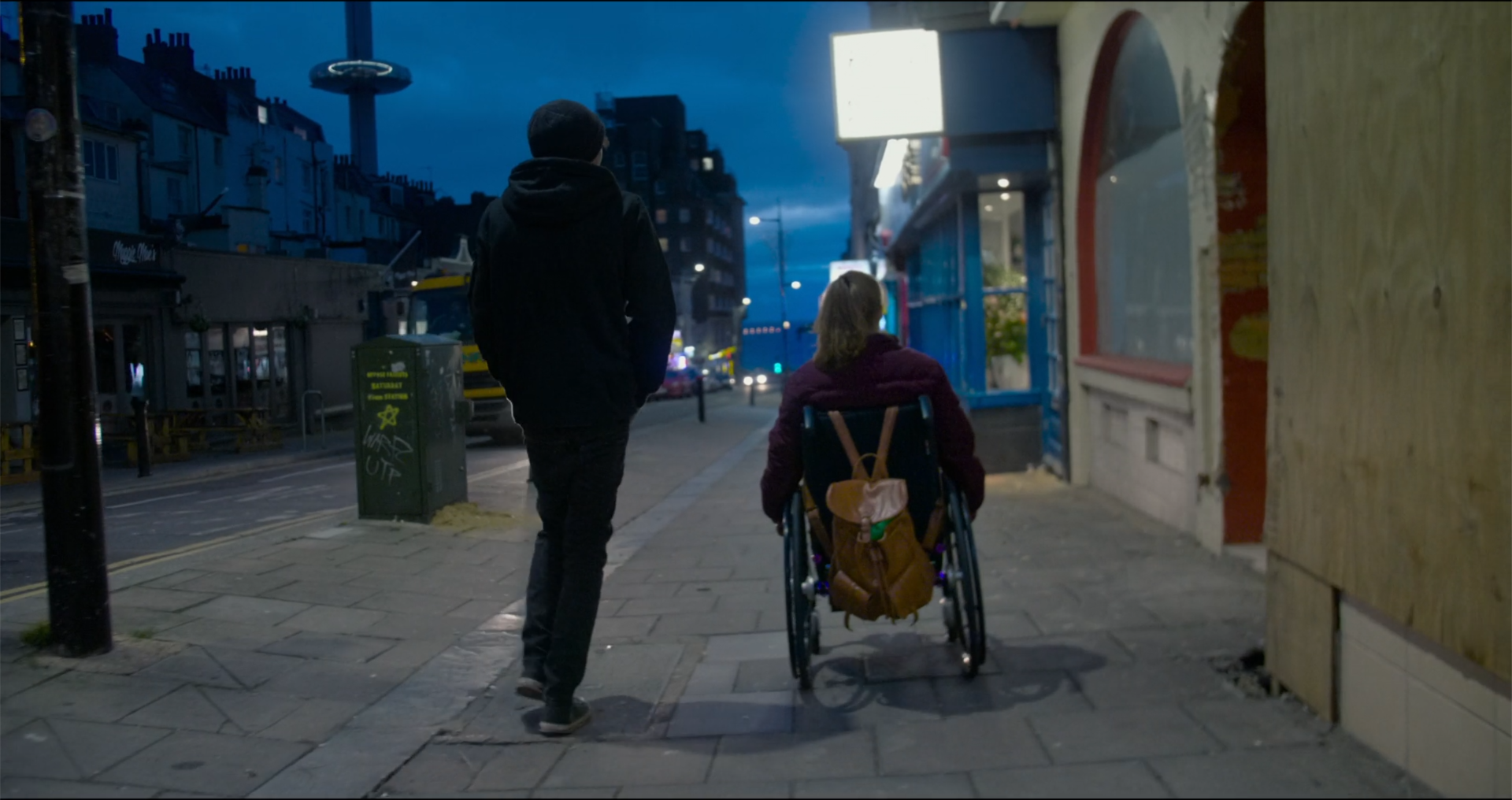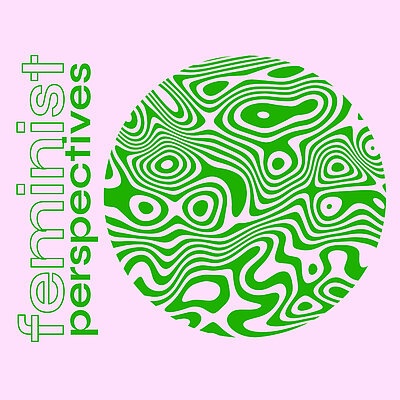
Sunday, December 7, 2027, 2 to 5 pm
Feminist Perspectives of Disability
PROGRAM 6 | IS THERE ANYBODY OUT THERE? Structures of Exclusion, Solidarity Beyond the Norm
Feminist Perspectives | Program 6 | IS THERE ANYBODY OUT THERE? – Structures of Exclusion, Solidarity Beyond the Norm
Ella Glendining was born with an extremely rare disability: she has no hip joints and very short femurs. So rare that she has never seen anyone with a body like hers. This experience of radical uniqueness leads to an existential question: Is there anybody out there like me? Is There Anybody Out There? documents Ella's four-year global search for people with similar bodies. The film becomes an investigation of what it means to radically love oneself as a disabled person in a non-disabled world, and a love letter to the Disability Community.
Ella is in the midst of life, has humor, tattoos, piercings, a job, and a partner—and is proud of her body. But the film also shows daily discrimination: light switches too high, people staring, employers discriminating, language hurting. During her search, Ella meets other people with rare disabilities and finds the community she was looking for. At the same time, the film documents Ella's unexpected pregnancy and motherhood—experiences practically invisible in media.
"I wanted this film to be a rallying cry for disabled people," says Ella. It poses fundamental questions of norm criticism: Who decides what a "normal" body is? How does the construction of "normality" make people invisible? The greatest barrier, the film tells us, is not the body but the world that defines this body as a problem—so lower the light switches! Is There Anybody Out There is a visually stunning, politically radical, and deeply personal film about the search for community as a political act against structural ableism and loneliness.
Following the screening, the festival's second panel titled LIVING IN AN ABLEIST WORLD IS BRUTAL… Expectations of Ability invites deepening the questions raised in the film and thinking together about ways not only to name structural ableism but to actively dismantle it.
The film makes visible that Ella's search is so difficult because the barriers she encounters work on multiple levels. There are physical barriers—light switches too high, countertops unreachable, public spaces inaccessible. Then social barriers—the staring, discrimination by employers, hurtful language. Further epistemic barriers—the lack of representation in media, missing medical information about her rare condition, absent role models. And finally reproductive barriers—the assumption that disabled people should not or cannot become parents, the invisibility of pregnancy and motherhood as a disabled person. These barriers work together and reinforce each other. Which of these barriers are hardest to overcome? How are they connected? And how can they be systematically dismantled—not through individual adaptation but through structural change?
Ella's experience of being medically invisible—there is hardly any reliable information about her condition, no studies, no established treatment paths—raises fundamental questions: Who actually decides what a "normal" body is? Whose body counts as the "normal case" according to which spaces, furniture, workplaces, social interactions are designed? How are people with rare disabilities made invisible through lack of medical and social recognition? What role does medical categorization play versus lived experience?
The film's central question—"Is there anybody out there?"—is self-evident for non-disabled people to answer: Yes, everywhere. For people with rare disabilities, the answer can be: Maybe not. This loneliness is not natural but the product of a system of exclusion. Why is community vital for disabled people? What does "kinship"—relatedness—mean beyond biological connections? How does one find community when one might be "the only one"? What role does the internet play in community building? The film shows moments of deep connection between Ella and the people she meets—especially with Priscilla Miranda, who says: "All the things Ella shares are the things I feel too, but don't necessarily share." These moments make clear: solidarity doesn't emerge automatically, it must be created. What does solidarity mean between people with different disabilities? Is there a common "Disability Community" or many different ones? How can non-disabled people be allies without appropriating? What is the difference between pity and solidarity?
Ella's path to radical self-love is also a fight against internalized ableism—those moments when she herself questions her worthiness, asks if she is enough. The film shows how ableism manifests daily: in gazes, in language, in spatial designs, in assumptions about what people can or cannot do. How do we recognize ableism when it's subtle? How do we distinguish between well-meaning "help" and paternalistic patronization? What does "radical self-love" mean as a political act against internalized devaluation? And what role do media and representation play in shifting notions of "normality"?
Ableism refers to a complex system of discrimination that devalues, excludes, and disadvantages people with disabilities. Architectural, institutional, structural, and linguistic forms of ableism create barriers for those who do not conform to prevailing hierarchies of ability or who fall outside dominant notions of “norm.” The term “ableism,” derived from the English word able, describes this system of classification and evaluation of abilities and the related forms of discrimination experienced by individuals or groups who do not meet ability expectations.
For people with disabilities, ableism—and the exclusions, devaluations, and marginalizations it produces—are part of everyday experience. The study of ableism is an important field within Disability Studies, critically engaging with the hierarchies and constructions of ability that societies produce, as well as with the complex structures of internalized discrimination.
As part of the festival Feminist Perspectives of Disability, artists and filmmakers address specific experiences of ableism, expressing them through situated perspectives. They challenge expectations of ability, foster shifts in perspective, outline inclusive approaches, and formulate institutional critiques.
In this panel, Alejandro Bachmann, Eva Egermann, and Michaela Joch discuss ableism in the cultural sector, the media and cinematic representation of disability, and the expectations of ability along with the resulting barriers and exclusions within universities and academic practice.
Alejandro Bachmann is a cultural worker specializing in film education, writing about film, and curating film programs focused on documentary and experimental forms. From 2010 to 2019, he was a research associate and later head of the Department of Education, Research, and Publications at the Austrian Film Museum. Since 2023, he has been Professor of Film History and Film Theory at the Academy of Media Arts Cologne, where, together with Katja Lell, he develops the project All Disabled Selves, a research group examining the interrelation of ableism and cinema on theoretical, structural, and institutional levels.
Eva Egermann is an artist based in Vienna. Her artistic and textual practice engages with activist movements and subcultures across different eras, reworking categories and political conditions of ability/weakness and non-conforming bodies. In 2012, she founded the magazine project Crip Magazine. She presents her work internationally in exhibitions and festivals and has contributed to conferences through her artistic research. Together with filmmaker Cordula Thym, Egermann produced the docu-fictional TV show C-TV (Wenn ich Dir sage, ich habe Dich gern…), which humorously and critically envisions a utopia of an inclusive film and media world. In 2023, they received the Diagonale Award for Innovative Cinema for this work.
Michaela Joch works at the University of Vienna in the field of inclusive pedagogy and has been active as a freelance trainer and lecturer since 2017 (including for myAbility). In her PhD at WU Vienna, she examined the accessibility of Austrian universities and developed perspectives on inclusive work, education, and social structures. She is a member of the Monitoring Committee for the Implementation of the UN Convention on the Rights of Persons with Disabilities and co-founder of the *Competence Team Women with Disabilities (ÖBR)**. Her experiences also inform her artistic practice, in which she explores disability, empowerment, and social transformation.
Information
PROGRAM 6
Sunday, December 7, 2025
2 to 5 pm
IS THERE ANYBODY OUT THERE? Structures of Exclusion, Solidarity Beyond the Norm
Is There Anybody Out There? (Ella Glendining, UK 2023, 87 min)
Followed by a conversation with
Ella Glendining (Zoom conversation in English, ÖGS)
Moderation: Clara Trischler
PANEL 2 | Living in an Ableist World is Brutal… Expectations of Ability
Moderation: Constanze Ruhm
with
Alejandro Bachmann
Eva Egermann
Michaela Joch
(in German, ÖGS)
Click here for the live stream for Panel 2.
Admission and screening is free; all you need to do is register online for a ticket. Please register for the slots only, that you can attend in person. Please exchange the ticket at the box office for a wristband, which also grants you free admission to all exhibitions at mumok on that day.
The organizers want to make it easy for everyone to join in by offering free admission, but appreciate a voluntary donation to help cover the costs. You will find the donation box at mumok cinema.

© mumok – museum moderner kunst stiftung ludwig wien